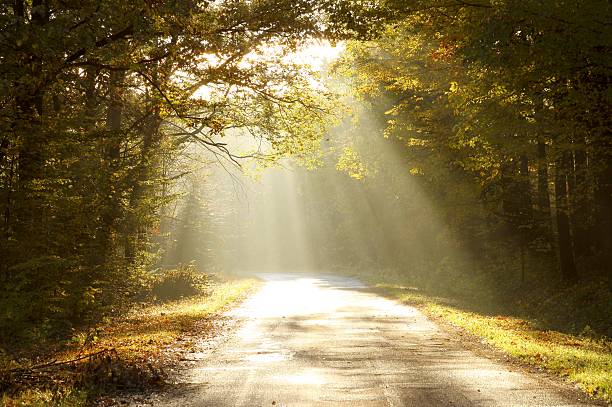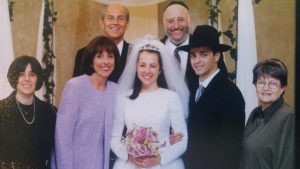To read the first three parts of Alexandra’s story, click the links below.
A question I am often asked when I share the story of my father’s conversion to Orthodoxy which brought our family to Torah observance is how I navigated the lifestyle change. Was I happy my father decided to convert? How did I feel about having to switch schools and move into the Orthodox community? Was I supportive or rebellious?
My parents included me in the process of becoming a religious family. It was a journey we were all traversing. We were doing it together.
Another key factor was that we become observant right before I would have entered the bar and bat mitzvah scene that characterized the Reform and Conservative communities to which we belonged. At 11, I remember attending one bar mitzvah and running out of the room when I was asked to dance. Had I been entrenched in the pre-teen norms of my community, I may have been less willing to accept the changes involved in joining the Orthodox world.
I naturally gravitated toward my classmates in the religious day school. Everyone made it a priority to welcome me and enable me to fit in. I struggled in my Hebrew classes, realizing I hadn’t grown up on Uncle Moishy or “Torah tzivah lanu Moshe” like the rest of my classmates. While I had attended after-school Hebrew classes over the years, I had a lot of catching up to do. In fact, it was this lacking that cultivated a drive within me, especially during high school, to take my Torah learning seriously. I always wanted to get to where my classmates were in their knowledge and skills. In fact, my decision to attend the summer learning program Michlelet NCSY the summer before 12th grade and even my seminary in Israel was with this goal in mind.
I also viewed challenges I faced as a teenager in a co-ed high school with the goal of who I wanted to be guiding my decisions. Most of my class was not Shomer Shabbos, so when any issue arose, whether it be a question of wearing pants again or doing something not appropriate for a religious girl, my response in my mind was always crystal clear. Why would I want to do something that someone who is not religious would do? I was on a journey, and I had no desire to turn back or veer off the path. We had worked so hard to get to the point we were at as a family and looking at my life as a part of a story helped me write the script with consciousness and clarity.
My family took on some aspects of observance slowly, while others we were required to adopt immediately when my father converted. I did not stop wearing pants until high school; my mother did not start covering her hair until I had graduated. We did everything when we were ready to do so with a sense of personal commitment, and no one was pressuring us or judging us.
In a school environment with so few Orthodox classmates, I found NCSY to be a haven which introduced me to role models in fellow NCSYers as well as advisors of how to be religious and cool. Because in my high school, being Orthodox was not cool. Shabbatons with their inspirational speakers and all the beautiful, heart-felt singing ignited my neshama and led me on a journey of my own. Over the course of my high school years, my involvement in my chapter grew and we developed a core group of kids in my high school who were NCSY cheerleaders amidst the competition of other youth groups.
After attending Michlelet, I had a clearer vision of the type of person I wanted to become. My involvement in NCSY took on a new level senior year, as I served on NCSY’s National Board, ultimately earning the title NCSYer of the year. (Thank you to Rabbi Jack Abramowitz for nominating me!) I attended a seminary primarily composed of girls who graduated from all-girls schools – me the eager, I-love-learning type of girl who came from the co-ed yeshiva high school and who couldn’t understand why some girls dragged their feet, with PJ pants under their skirts, to Nach Yomi in the morning. I thought that if you had the privilege of attending a bais yaakov for high school, then you must love learning, too.
After seminary, I went to Stern College for Women where I earned my degree in English/Communications. While in Stern, I hardly thought about my untraditional background. I was like everyone else. Grew up with NCSY, went to seminary and chose to go to Stern. I only started thinking more about my father’s conversion when I started dating.
A roommate of mine set me up with a boy in Yeshiva College. We talked on the phone first. For some reason, I decided to mention that my father was a convert. He paused, and then said that he was a Kohen and he thought it might be an issue.
My aunt and uncle were still living in Manhattan, so I reached out to them. I was quite distraught. My father’s conversion was always a source of pride for me. And I knew I was always a Jew since my mother was Jewish. My father being a non-Jew couldn’t possibly affect my Jewish status in any way!
My uncle got on the phone with a well-known YU Rosh Yeshiva to explain the situation. My uncle passed me the phone and the Rav explained to me with great sensitivity how a child of a convert, who was born when one of the parents was a non-Jew, would not be allowed to marry a Kohen.
Of course, I knew about the concept of bashert, and of course I knew that I was Jew through and through, but this new knowledge was painful. I felt for the first time that my life circumstances left a stain on me.
Another painful event occurred when I was an NCSY advisor and met with one of the NCSY rabbis on a Shabbaton to discuss shidduchim. The rabbi had thought of another advisor for me and had already spoken to the boy who agreed to go out. I knew the boy from being advisors together and felt it wasn’t a shidduch. “But I don’t understand,” the rabbi said. “He doesn’t mind that your father is a convert.”
My shidduchim were not going to be based on whether a prospective shidduch was okay with my father being a convert. This would not it be the sole factor in defining me.
Shidduchim is so much about hashkafa and being an out-of-towner who didn’t come from a family who fit into a box, I had to put in efforts on my own while living in New York to meet with shadchanim and represent myself. Thankfully, my bashert was just around the corner.
A good friend of mine from high school who grew up Conservative and became more observant through NCSY called me up. He was learning in Ner Israel. We didn’t talk anymore.
He said he had a Shabbos meal with a boy who had just come to the yeshiva and he thought of me. My friend was the perfect shadchan because he knew me. Coincidentally, good family friends from Atlanta who moved to this boy’s town had already thought of the shidduch.
The rest, of course, is history.
Alexandra and Daniel with her parents, her cousin and her uncle and aunt
While we were dating, Daniel thought to call Rabbi Feldman, the rabbi who converted my father in Atlanta, to find out if he should be aware of any concerns or issues since I was born before my father converted. Rabbi Feldman assured him that there were none. “I would marry her off to one of my own sons,” he had said.
That was 16 years ago. Now we are raising teenagers of our own, dealing with questions like everyone else as to how to raise motivated kids who take ownership of their Judaism. I took ownership of mine growing up because it wasn’t handed to me. I had to work for it. My kids don’t. It’s a whole different ball game.
When I was single, a dear friend advised me not to wear my heart on my sleeve and to allow people to base me on my merits of who I was b’asher hu sham — where I was – and not where I was coming from. And based on where I am today, no one would have imagined that I grew up the way I did.
But this story is my personal yichus, my unique lineage. And my children should be proud to own it. Instead of worrying out about people finding out the truth, those of us in the Orthodox community who are baalei teshuva should be worried about keeping the truth alive. It is because of our unique backgrounds, and the sacrifices we have made for our Judaism, that we are the people we are today. And if it inspires someone else to appreciate their Yiddishkeit in a new light, then we have an obligation to share it.
Thank you for coming on this journey with me.
To read the first three parts of this series, please see:
Part I: It All Started with a Roll of LifeSavers
Part II: From St. James to Sante Fe
Part III: Our Journey to Judaism: A New Family is Born
Alexandra Fleksher is an educator, a published writer on Jewish contemporary issues, and an active member of her Jewish community in Cleveland, Ohio. You can find her blog and published articles on www.alexandrafleksher.com.
The words of this author reflect his/her own opinions and do not necessarily represent the official position of the Orthodox Union.




